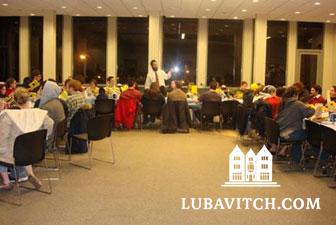(lubavitch.com) For some, counting pages in the Haggadah until the “let’s eat” portion of the Seder is as much of a ritual as eating the bitter herbs.
Earlier this week, Chabad Chevra of Hartford University in Connecticut offered a case study in keeping the message of Passover from getting lost in the matzah crumbs.
Of the 100 people at the Seders at U of H, many fell in between the middle ground of Jewish affiliation: They had no plans to make it home for family Seders, but were still interested in marking the holiday.
“At the Seder and during Rosh Hashanah, that’s when I see the most new faces,” said co-director of Chabad Chevra Dalia Kulek.
Rabbi Yosef Kulek, Dalia’s husband and Chevra co-director, said a good number of students who’ve gone onto attend Chabad’s classes, programs, Shabbat dinners, kosher meal hours, and yeshivas in Israel first encountered Chabad at the Seder.
As such, striking a balance between offering the students an interesting Seder without compromising on the traditional, authentic experience takes on great importance. To figure out the best approach, Rabbi Kulek brainstormed with his Chabad on campus colleagues, who hosted some 500 campus Seders around the world this Passover.
The plan was to elaborate on the classic portions of the Seder that everyone has heard of but doesn’t know much about. The “Four Sons” section, for instance, had their full story told so that students “saw how their roles are relevant to us today, in 2008,” said Rabbi Kulek.
Most of the deep discussion, about the spiritual meaning of the Exodus, was held off until after the meal. “It was easier to keep everyone motivated on a full stomach than starving,” he said.
University of Hartford senior Brian Fischoff has been attending Chabad Chevra’s Seder for four years, and has “enjoyed its warmth and family atmosphere. Everyone feels comfortable.”
His mention of family atmosphere may be taken quite literally. Even though the Seders started at 8:30 p.m. on both nights, and the hour was late, the Kulek kids were right there, involved in the Seder. The spotlight was on them during the recitation of the Ten Plagues when the kids sang Passover songs, dramatized the ten plagues – plastic frogs, roaring wild beasts and all, to the delight of the students.
“It was the kids’ shining moment,” said Mrs. Kulek. As much as it was a living lesson to the students about the centrality of children to Jewish family life, it imbued the Kulek bunch with a sense of pride in their role.
“I want them to love doing what we do. I want them to understand why we’ve chosen to live in a place where they can’t get kosher candy and to love it enough that they continue it when they grow up.”
She knows firsthand what can happen when the Jewish experience is presented correctly. Mrs. Kulek’s mom is from Mexico, her dad is an Israeli, and her first encounter with Jewish study was at Hebrew School in Chabad of Tarzana, CA. She spent summers at Chabad’s Camp Gan Israel, and never imagined she’d one day lead her own Chabad center.
“I enjoy planning and preparing the Seder. I have students at my home every night.” It’s a lifestyle, Mrs. Kulek said, “full of energy and adrenaline.”
Chabad Chevra hosted its two Seders in two locations. The first night was at the Kulek home, purchased with help from a Rohr Family Foundation grant, and the second was at the Gengras Student Union.
“We feel very strongly that we should hold events on campus, where people can find us easily,” said Rabbi Kuleck.
A good number of guests have found out about the Seder because Chabad Chevra is an official student group with its events listed in the university calendar and on the university website. Alumni living in the area turned up, as did students from other colleges who found Chabad Chevra through Google and the ubiquitous Facebook invite. Just to be sure the message got out to as many U of H students as possible, Rabbi Kulek hung Seder information posters as well.
His enthusiasm comes from seeing what Chabad can accomplish when a student has a meaningful Seder or Shabbat or holiday or kosher meal experience. When Fischoff started college, he had “never heard of Chabad.” Now when he returns home to Ocean, NJ, he and his parents attend their local Chabad, he said.
“My parents love how I am inspired as a Jew through Chabad.”

Be the first to write a comment.